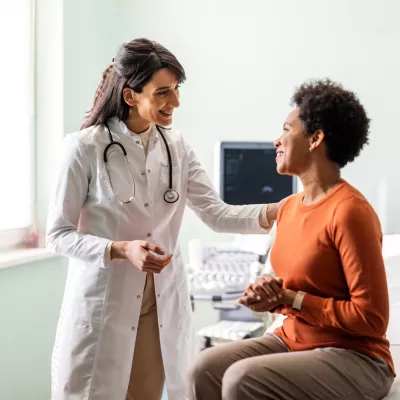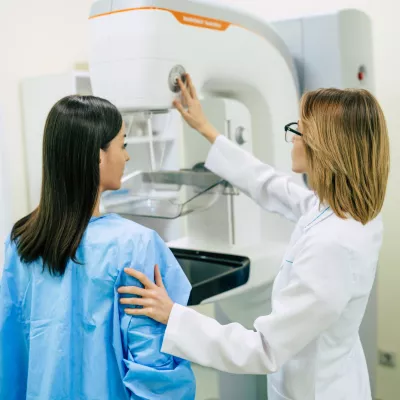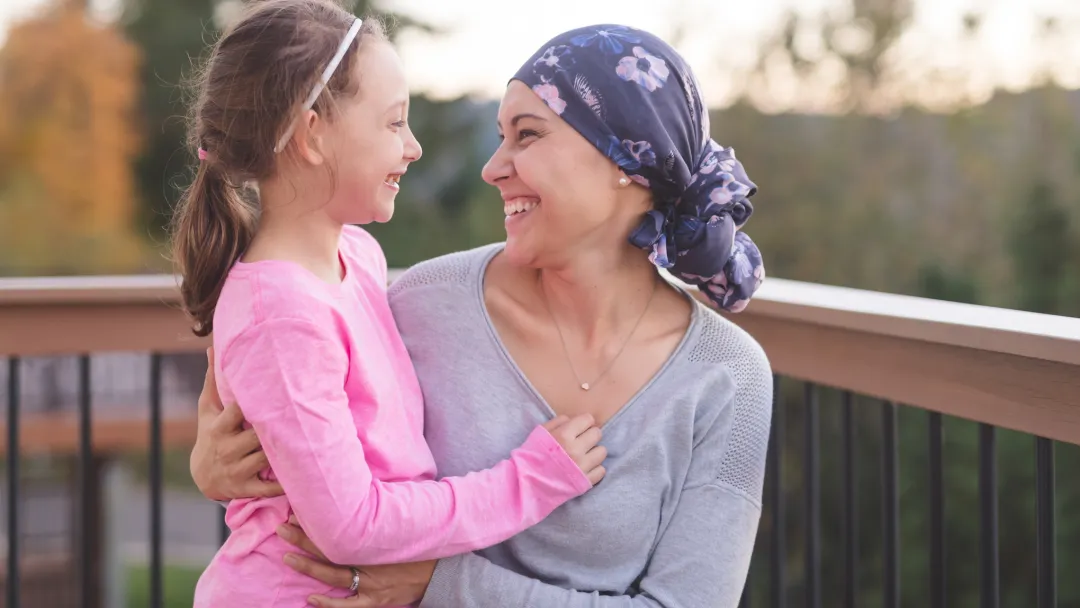
Accredited, Compassionate Cancer Treatment
Accredited by the Commission on Cancer as an Integrated Network Cancer Program, with network facilities accredited by the National Accreditation Program for Breast Cancer (NAPRC), our cancer care network is at work for you. From screenings to detect the earliest signs of cancer to innovative treatment options for the best possible outcomes, we're committed to providing you with exceptional cancer care.
Cancers We Treat
We believe in providing whole-person care for body, mind and spirit, using the most advanced technology available and a healing environment designed specifically for your needs.
Cancer is not just one disease, and there’s not just one answer. Our cancer care team includes a range of specialists with expertise in many types of cancer.
-
Brain, Neurological and Spine Cancers
Both benign and malignant tumors in the brain and spine can cause symptoms requiring treatment. Our specialists diagnose using advanced technology and will work with you to create a personalized treatment plan.
-
Breast Cancer
When you or a loved one is diagnosed with breast cancer, it can turn your world upside down. We're dedicated to providing expert care to support your whole health. Your care team is ready to make a difference.
-
Colorectal Cancers
A colorectal cancer diagnosis (cancer in your colon, large intestine or rectum) can come as a shock. We're here to help you make sense of it while developing a plan that puts you on a path to healing.
-
Gynecologic Cancers
Our gynecologic oncology program treats cancers like cervical, ovarian, uterine, vaginal, vulvar, peritoneal and tubal cancer, as well as gestational trophoblastic neoplasia (a rare cancer of the placenta).
-
Head and Neck Cancers
Our experts are experienced in treating complex cancers of the larynx, throat, lips, mouth, nose and salivary glands, giving you peace of mind knowing you’re getting the best possible care.
-
Kidney Cancer
Because the kidneys are deep inside the body, cancer may go undetected until you experience symptoms. Our expert team skillfully treats kidney cancer with a holistic approach that addresses all the needs of this disease.
-
Leukemia and Lymphoma
Leukemia is the most common cancer in people 20 and younger, and a diagnosis for you or your child can change your world. Our highly skilled team treats cancers of the blood, bone marrow and lymph nodes with expert care and compassion.
-
Lung Cancer
We offer lifesaving lung cancer treatments that can give you hope and lead to improved quality of life. Since smoking is a major risk factor, it’s recommended that smokers undergo preventive screenings.
-
Pancreatic Cancer
A pancreatic cancer diagnosis requires immediate, expert care. Our oncology specialists offer advanced treatment options to address the rapid nature of this disease.
-
Prostate Cancer
Prostate cancer is often slow-growing and seldom causes symptoms until advanced stages. Our oncology team understands your decisions about treatment are personal. We’re dedicated to helping you make informed choices.
-
Skin Cancer
The most common cancer, skin cancer accounts for nearly half of all cancers in the U.S. We treat all forms of skin cancer, and you’ll feel at ease knowing you have access to the latest treatments and advanced technology for expert care.
-
Thyroid Cancer
A thyroid cancer diagnosis requires special care to address both the cancer and the wide-reaching effects of this disease. Our experts provide comprehensive care to help as you move from diagnosis to treatment and beyond.
Trust Award-Winning Cancer Care

Honored To Be an Emerald Award Winner
The Leapfrog Group has exclusively recognized AdventHealth for remarkable achievements and leadership in patient safety, quality and transparency, including maintaining a culture of excellence throughout all organizational levels. Delivering consistent, quality whole-person care is our priority, and we’re honored to be the first health care system to earn this award.

The Leapfrog Group Hospital Safety Grade "A"
Our local hospitals are recognized among America’s highest-rated hospitals for patient safety by The Leapfrog Group. We're committed to maintaining the highest standards of safety and care.
- AdventHealth Avista
- AdventHealth Littleton
- AdventHealth Castle Rock
- AdventHealth Porter

Schedule Your Screening Mammogram
Early detection is the best defense we have against cancer, and annual mammograms are a crucial step in that fight. Mammography can identify areas of concern long before they're noticeable by touch or sight, significantly improving the chances of successful treatment.
The convenience of online scheduling helps you prioritize your health, making it easier to book appointments and stay proactive about regular screenings.
Know Your Cancer Risk and Get Tested
Prevention and early detection are two of the most powerful tools against cancer. Knowing and reducing your risks, getting regular screenings as recommended by your primary care provider, and seeking treatment when issues or concerns arise can all help to save your life.
- Early Detection and Screenings
-
Annual Physical Exams
An annual exam with your primary care provider is an important prevention strategy. You and your doctor can discuss any changes or health concerns and devise a plan for appropriate screenings. It also allows your provider to check your vital signs, like blood pressure and heart rate, and your general appearance and perform other routine tests to detect issues that may not be causing noticeable symptoms.
Mammography
The American Cancer Society recommends that women ages 45 to 54 get a mammogram every year. Women may begin yearly mammograms at age 40 if they choose. Women 55 or older may continue annual mammograms or switch to every two years. You and your doctor can discuss the schedule that’s right for you. Some women with a family history of breast cancer or other risk factors may benefit from additional screening. All women should become familiar with how their breasts normally look and feel so they can promptly report any changes to their doctor. Schedule your annual mammogram online.
Lung Screenings
We’re committed to keeping lungs healthy. We offer a lung screening program to individuals at high risk for developing lung cancer, like people with a history of smoking or current smokers. Our goal is to screen as many high-risk individuals as possible.
Cervical Cancer Screenings
Women should begin undergoing cervical cancer screenings by 21 years old. Women 21 to 29 should have a Pap test every three years. Women 30 to 65 should have a Pap test plus a human papillomavirus (HPV) test every five years. Women over 65 who have had regular cervical cancer testing with normal results no longer need to be tested.
Colonoscopy
A colonoscopy can detect colon polyps and other early signs of colorectal cancers. Individuals 45 and older should have a colonoscopy every 10 years.
- Prevention and Risk Reduction
-
The American Cancer Society estimates that more than half of all cancer diagnoses and deaths could be prevented through proper cancer prevention measures.
Among the most important cancer prevention measures you can take are:
- Regular well visits with a primary care provider
- Maintain healthy lifestyle habits
- Stay vigilant about early signs of cancer
Talk With Your Primary Care Provider
Some risk factors you can’t avoid, such as your age and family history. But even for factors you can’t change, there are still things you can do. When it comes to cancer, early detection dramatically increases the options and effectiveness of treatment. Talk with your doctor to develop a plan for screenings and lifestyle changes and stay on top of any warning signs that might occur.
If you have a family history of cancer, your doctor may recommend a genetic risk assessment. We offer genetic counseling to individuals shown to be at higher risk for certain cancers, including breast cancer. Genetic counselors can create an individualized plan to help you manage your risks, know what signs to look for and create a schedule for regular screenings.
Healthy Choices Make a Difference
Among some of the greatest risk factors for cancer are lifestyle choices. The World Cancer Research Fund estimates nearly 20% percent of all cancers in the U.S. are caused by a combination of excess weight, poor nutrition, excess alcohol use and a sedentary lifestyle.
Some of the biggest changes you can make in your life are to:
- Quit smoking: Tobacco use accounts for nearly 30% of all cancer deaths in the U.S.
- If you drink, drink in moderation: Alcohol abuse raises the risk of many cancers, including mouth, throat, esophageal, liver, breast and colorectal cancers
- Exercise and maintain a healthy weight: Excess body weight and lack of physical activity are key factors in the risk of many cancers and other chronic health conditions
- Avoid excessive sun exposure: Skin cancer, the most common form of cancer, is largely caused by unprotected exposure to the sun and harmful UV rays

We’re By Your Side at Every Step
A cancer diagnosis requires more than just exceptional care for your physical health; it requires great emotional and spiritual strength. That’s why we offer a wide range of support services to help you cope with your cancer experience, from diagnosis to treatment and beyond.
Caring for Your Whole Health Together
No matter your health and wellness journey, we know you have questions and decisions to make about your care. Our experts are here to support you every step of the way. When you request an appointment, we’ll contact you within 48 hours.
Or Call Us at Call844-228-7608

